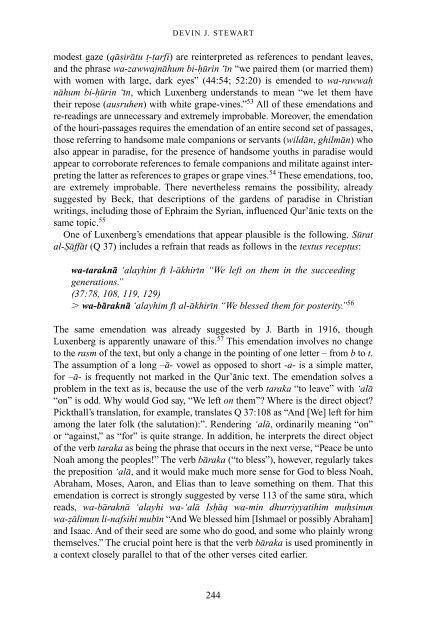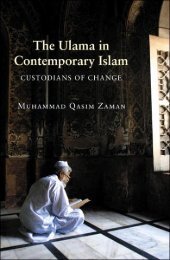The Qur'an in its historical context (pdf - Islam and Christian-Muslim ...
The Qur'an in its historical context (pdf - Islam and Christian-Muslim ...
The Qur'an in its historical context (pdf - Islam and Christian-Muslim ...
Create successful ePaper yourself
Turn your PDF publications into a flip-book with our unique Google optimized e-Paper software.
DEVIN J. STEWART<br />
modest gaze (qasiratu t-tarfi) are re<strong>in</strong>terpreted as references to pendant leaves,<br />
<strong>and</strong> the phrase wa-zawwajnahum bi-hur<strong>in</strong> ‘<strong>in</strong> “we paired them (or married them)<br />
with women with large, dark eyes” (44:54; 52:20) is emended to wa-rawwah<br />
nahum bi-hur<strong>in</strong> ‘<strong>in</strong>, which Luxenberg underst<strong>and</strong>s to mean “we let them have<br />
their repose (ausruhen) with white grape-v<strong>in</strong>es.” 53 All of these emendations <strong>and</strong><br />
re-read<strong>in</strong>gs are unnecessary <strong>and</strong> extremely improbable. Moreover, the emendation<br />
of the houri-passages requires the emendation of an entire second set of passages,<br />
those referr<strong>in</strong>g to h<strong>and</strong>some male companions or servants (wildan, ghilman) who<br />
also appear <strong>in</strong> paradise, for the presence of h<strong>and</strong>some youths <strong>in</strong> paradise would<br />
appear to corroborate references to female companions <strong>and</strong> militate aga<strong>in</strong>st <strong>in</strong>terpret<strong>in</strong>g<br />
the latter as references to grapes or grape v<strong>in</strong>es. 54 <strong>The</strong>se emendations, too,<br />
are extremely improbable. <strong>The</strong>re nevertheless rema<strong>in</strong>s the possibility, already<br />
suggested by Beck, that descriptions of the gardens of paradise <strong>in</strong> <strong>Christian</strong><br />
writ<strong>in</strong>gs, <strong>in</strong>clud<strong>in</strong>g those of Ephraim the Syrian, <strong>in</strong>fluenced Qur’anic texts on the<br />
same topic. 55<br />
One of Luxenberg’s emendations that appear plausible is the follow<strong>in</strong>g. Surat<br />
al-Saffat (Q 37) <strong>in</strong>cludes a refra<strong>in</strong> that reads as follows <strong>in</strong> the textus receptus:<br />
wa-tarakna ‘alayhim fi l-akhir<strong>in</strong> “We left on them <strong>in</strong> the succeed<strong>in</strong>g<br />
generations.”<br />
(37:78, 108, 119, 129)<br />
� wa-barakna ‘alayhim fi al-akhir<strong>in</strong> “We blessed them for posterity.” 56<br />
<strong>The</strong> same emendation was already suggested by J. Barth <strong>in</strong> 1916, though<br />
Luxenberg is apparently unaware of this. 57 This emendation <strong>in</strong>volves no change<br />
to the rasm of the text, but only a change <strong>in</strong> the po<strong>in</strong>t<strong>in</strong>g of one letter – from b to t.<br />
<strong>The</strong> assumption of a long –a- vowel as opposed to short -a- is a simple matter,<br />
for –a- is frequently not marked <strong>in</strong> the Qur’anic text. <strong>The</strong> emendation solves a<br />
problem <strong>in</strong> the text as is, because the use of the verb taraka “to leave” with ‘ala<br />
“on” is odd. Why would God say, “We left on them”? Where is the direct object?<br />
Pickthall’s translation, for example, translates Q 37:108 as “And [We] left for him<br />
among the later folk (the salutation):”. Render<strong>in</strong>g ‘ala, ord<strong>in</strong>arily mean<strong>in</strong>g “on”<br />
or “aga<strong>in</strong>st,” as “for” is quite strange. In addition, he <strong>in</strong>terprets the direct object<br />
of the verb taraka as be<strong>in</strong>g the phrase that occurs <strong>in</strong> the next verse, “Peace be unto<br />
Noah among the peoples!” <strong>The</strong> verb baraka (“to bless”), however, regularly takes<br />
the preposition ‘ala, <strong>and</strong> it would make much more sense for God to bless Noah,<br />
Abraham, Moses, Aaron, <strong>and</strong> Elias than to leave someth<strong>in</strong>g on them. That this<br />
emendation is correct is strongly suggested by verse 113 of the same sura, which<br />
reads, wa-barakna ‘alayhi wa-‘ala Ishaq wa-m<strong>in</strong> dhurriyyatihim muhs<strong>in</strong>un<br />
wa-zalimun li-nafsihi mub<strong>in</strong> “And We blessed him [Ishmael or possibly Abraham]<br />
<strong>and</strong> Isaac. And of their seed are some who do good, <strong>and</strong> some who pla<strong>in</strong>ly wrong<br />
themselves.” <strong>The</strong> crucial po<strong>in</strong>t here is that the verb baraka is used prom<strong>in</strong>ently <strong>in</strong><br />
a <strong>context</strong> closely parallel to that of the other verses cited earlier.<br />
244



